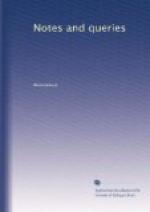Glide down the Thames by London Bridge, what time
St. Saviour’s bells strike out their evening chime;
Forth leaps the ompetuous cataract of sound,
Dash’d into noise by countless echoes round.
Pass on—it follows—all the jarring notes
Blend in celestial harmony, that floats
Above, below, around: the ravish’d ear
Finds all the fault its own—it was TOO NEAR.
RUFUS.
St. Evona’s Choice.—To your citation of Ben Jonson’s exceptional case of the Justice Randall as “a lawyer an honest man,” in justice add the name of the learned and elegant author of Eunomus; for Mr. Wynne himself tells the story of St. Evona’s choice (Dialogue II. p. 62. 3rd ed. Dublin, 1791), giving his authority in the following note:—
“The story here
dressed up is told in substance in a small book
published in 1691, called
a Description of the Netherlands,” p.
58.
In strict law, Sir, the profession may in courts of Momus be held bound by the act of the respectable but unlucky St. Evona; but in equity, let me respectfully claim release, for Evona was a churchman.
A TEMPLAR.
[We gladly insert our correspondent’s “claim to release,” but doubt whether he can establish it; inasmuch as St. Ivo or Evona, canonized on account of his great rectitude and profound knowledge both of civil and canon law, was both lawyer and churchman, like the CLERICUS so recently discussed in our columns; and clearly sought for and obtained his patron saint in his legal character.]
Muffins and Crumpets, &c.—Not being quite satisfied with the etymology of “muffin,” in p. 205., though brought by Urquhart from Phoenicia and the Pillars of Hercules, I am desirous of seeking additional illustration. Some fancy that “coffee” was known to Athenaeus, and that he saw it clearly in the “black broth” of the Lacedaemonian youth. In the same agreeable manner we are referred to that instructive and entertaining writer for the corresponding luxury of “muffins.” Maphula, we are told, was one of those kinds of bread named as such by Athenaeus; that is to say, “a cake baked on a hearth or griddle.” If we need go so far, why not fetch our muffins from Memphis, which is Moph in Hebrew? (See Hosea, ix. 6.) It is, perhaps, mou-pain, in old French, soft bread, easily converted into mouffin. So “crumpet” may be a corruption of crumpate a paste made of fine flour, slightly baked. The only difficulty would then be in the {254} first syllable, concerning, which the ingenuity of your various correspondents, Mr. Editor, may be exercised to some effect. Is it connected with the use of the crimping irons in producing these delicacies?
HYPOMAGIRUS.
Oxford.
Dulcarnon.—Dulcarnon is one of those words in Chaucer which Tyrwhitt professes that he does not understand. It occurs in Trolius and Creseide, book iii. 931.933. Creseide says:—




